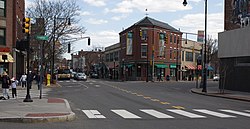Inman Square
|
Inman Square Historic District
|
|
 |
|
| Location | Cambridge, Massachusetts |
|---|---|
| Coordinates | 42°22′25.4″N 71°6′3.0″W / 42.373722°N 71.100833°WCoordinates: 42°22′25.4″N 71°6′3.0″W / 42.373722°N 71.100833°W |
| Architect | Newhall & Blevins; Atlantic Terra Cotta Company |
| MPS | Cambridge MRA |
| NRHP Reference # | |
| Added to NRHP | April 13, 1982 |
Inman Square is a neighborhood in Cambridge, Massachusetts. It lies north of Central Square, at the junction of Cambridge, Hampshire, and Inman Streets near the Cambridge–Somerville border.
Like many squares in the Boston area, Inman Square refers both to an intersection and to a retail district and neighborhood. Current residents of the area seem to converge on a broad definition of Inman Square as the region centered on the intersection of Cambridge and Hampshire Streets.
Geologically, the area is part of the larger Boston Basin and attaches to the relative lowland known as the Cambridge Plain. Originally, the land was both flat and surrounded by an irregular, swampy region that formed a natural boundary. Situated a short walk east of Harvard Square, north of Central Square, south of Union Square, and west of Lechmere (also known as East Cambridge), Inman Square is fairly centralized within the Mid-Cambridge/Somerville area. Hampshire Street connects it with Porter Square to the northwest and Kendall Square to the southeast.
Inman Square likely owes its name to Ralph Inman (1713–1788), described as a gentleman of fortune and a Boston merchant. The details of his life can be pieced together from articles in the New England and Genealogical Register, vols. 12, 14, 25, 26, 30, 55, 84, 112, and 136, as well as numerous other sources. He had extensive business interests along the Boston wharf and with Thomas Sodden owned 400 acres (1.6 km2) making up "what is now the Port."
Inman also owned a "large, three-story rambling mansion" in a "little genteel Town about 4 Miles off (from Boston) calld Cambridge, where a number of Gentlemen's Families live upon their Estates." This included the Brattles, after whom Brattle Square was named.
...
Wikipedia


